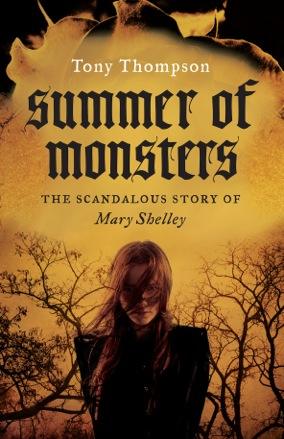Tony Thompson talks to Reading Time about the inception and writing of Summer of Monsters and the allure of Mary Shelley…
The phrase ‘hard act to follow’ didn’t really cover this one. I was on a panel at an English teachers conference. The topic was horror and I was the third speaker. The second speaker was a vampire.
I’m not speaking metaphorically here or attempting some kind of elaborate literary move to make a point. This man was a vampire or, at least, a legal vampire, as he put it. And a good speaker. He had a roomful of English teachers mesmerized (metaphorically, in this case) and had me wondering if I had a crucifix or some garlic in my bag. I had just written a book about the history of vampire stories but I couldn’t think of one thing that I could say that would be of interest after the performance of an actual one. When his time drew to a close, I knew that I was going to have to come up with something pretty good.
I stood up and asked if there were any meteorologists in the room. There weren’t so I explained that the summer of 1816 was the most famous year in weather history. In that year, there was no summer in Europe. This led to famines, floods, and droughts. It also led a group of young English people, bored witless by the ceaseless rain, to devise a story telling contest that would result in a teenager producing the most famous novel ever written. The novel of course is Frankenstein and the teenage writer was Mary Shelley.
It’s a good story and it saved me that afternoon as it had a few times when I was a high school teacher. It’s a book that everyone has heard of, even if they haven’t read it. The fact that it was written by someone so young and in circumstances wild enough to include Lord Byron is part of its appeal. But I have always sensed that there was an even bigger story behind Frankenstein and I began to investigate it with a view to writing a biography of Mary Shelley for teenagers – BUT I wrote a novel instead.
A good story doesn’t necessarily translate into a good novel, or a good movie for that matter. There have been several attempts to film the ‘Geneva Summer’ without success. I found them instructive to watch however while I was writing the book. Ken Russell’s dreadful 1986 film, Gothic was a masterclass in turning something that really happened into something that couldn’t possibly have. It’s an exceptional story. Why mess with it? Several novelists have attempted it with varying success. From their books, I learned that Lord Byron and Percy Shelley could be very dangerous, if they weren’t watched.
For years, Frankenstein was mistakenly assumed to be mainly Percy’s work. Several biographies of the poet that appeared in the early 20th century made this suggestion. It was actually the young Muriel Spark who wrote the first serious biography of the book’s true author. In its wake, Mary Shelley’s literary stakes once again rose. It is a sad but telling irony that her mother suffered the same fate. In Mary Shelley’s lifetime, Mary Wollstonecraft was discredited and somewhat forgotten. You can find out why in my book!
There is no question that Lord Byron and Percy Shelley are two of the most interesting figures in literary history but I was interested in Mary. How did she come to write this novel? It’s best known as a cautionary tale about science but I sensed, as others have before me, that it was also a deeply personal story. I wanted to explore that possibility in the novel. 
For obvious reasons, Mary is always lumped in with the Romantics. A simplistic reading of Frankenstein suggests a critique of the Enlightenment ideas of reason and experimentation. I was interested in the possibly of Victor as a Romantic. Percy Shelley had a deep, if somewhat fanciful, interest in science. He regarded it as one more avenue for the human imagination, his great subject. Mary had reservations, clearly. She had a wonderful mind and questioned everything. She had grown up listening to her father and a circle that included everyone from Blake and Coleridge to the disgraced American politician Aaron Burr. Her critical facilities would have been sharpened at a young age and I think she gave it free reign in Frankenstein.
My favourite band of all time is The Waterboys. I thought a lot about their most famous song, The Whole of the Moon, while I was writing this book. The song is addressed to someone whose ability to understand and see is as natural as it is effortless. Line by line, the singer contrasts this with his own less successful attempts to broaden his consciousness. ‘I saw the lone empty valley, you saw Brigadoon!’ Lord Byron and Percy Shelley were large living men of the world, not to mention members of the nobility, but it was Mary Shelley, from bohemian East London who saw the whole of the moon and made the most enduring statement of the age.
The moral of the story: Never invite a vampire onto a panel but if you do, Mary Shelley will be there.

